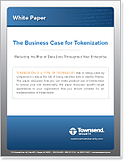White Paper: Business Case for Tokenization
|
Tokenizing sensitive data delivers an outstanding return on investment (ROI) to businesses by providing a risk-reduction of losing sensitive data. By tokenizing data, organizations can reduce the chance of losing sensitive information – credit card numbers, social security numbers, banking information, and other types of PII. In some cases tokenization can take an entire server or database application out of scope for compliance regulations. This blog will discuss how tokenization can reduce risks in customer service departments, with outside services, and in BI and Query environments.
Tokenization for Customer Service
Tokenization can reduce risk in the customer service department by removing sensitive data from customer service databases. For out-sourced operations you should tokenize data before sending it to the outside service. A customer service worker can still accept real information on the phone from an end customer, but there is no need to store the actual information in a database that can be stolen. Tokenization services will associate real information with tokenized information for data retrieval. While using tokenization in a customer service environment can’t completely remove the risk of data loss, but it can dramatically reduce the amount of data at risk and help you identify potential problems.
Tokenization for Outside Services
Many retail companies send their Point-Of-Sale transaction information to analytics service providers for trend and business analysis. The service provider identifies trends, spots potential problems with supply chains, and helps evaluate the effectiveness of promotions. In some cases, service providers consolidate information from a large number of companies to provide global trends and analysis. You can avoid the risk of data loss by replacing the sensitive data (names, credit card numbers, addresses, etc.) with tokens before sending the data to the service provider.
Tokenization for Business Intelligence and Query
Many IT departments help their business users analyze data by providing them with business intelligence (BI), query reporting tools, and databases of historical information. These tools and databases have empowered end-users to create their own reports, analyze business trends, and take more responsibility for the business. This practice has decreased workloads and increased efficiency in IT departments.
Unfortunately, these tools and databases open a new point of loss for sensitive information. A database with years of historical information about customers, suppliers, or employees is a high value target for data thieves. Criminals aggregate this type of information to provide a complete profile of an individual, making it easier to steal their identity. When tokens replace names, addresses, and social security numbers, this makes the BI database unusable for identity theft, while maintaining the relational integrity of the data. Tokenizing business intelligence data is an easy win to reduce your risk of exposure.
Download our white paper “The Business Case for Tokenization: Reducing the Risk of Data Loss” to see how tokenization is helping organizations meet their business goals without exposing their sensitive data to loss.


